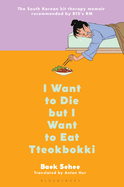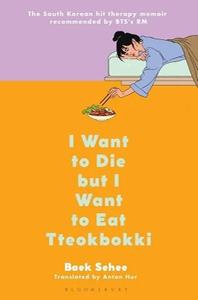
 Baek Sehee ingeniously combines elements of memoir and self-help in her first book, I Want to Die but I Want to Eat Tteokbokki, a bestseller in her native South Korea. She offers an intimate look into one patient's experience in therapy and her own analysis of and takeaways from those sessions.
Baek Sehee ingeniously combines elements of memoir and self-help in her first book, I Want to Die but I Want to Eat Tteokbokki, a bestseller in her native South Korea. She offers an intimate look into one patient's experience in therapy and her own analysis of and takeaways from those sessions.
Consumed by a desperate sense of emptiness she calls "a vague state of being not-fine and not-devastated at the same time," Sehee seeks the help of a psychiatrist, ultimately resulting in a diagnosis of dysthymia, or persistent depressive disorder. I Want to Die but I Want to Eat Tteokbokki is an account of the treatment she received for that diagnosis, "full of personal and sometimes pathetic details... to make it more than just a venting of my dark emotions."
Sehee approaches this account with a sense of precision and detailed emotional accounting, not merely recalling her psychiatric sessions from memory, but transcribing her recordings of the sessions word for word across the pages of this book. She then adds her own analysis of each session, drawing in real-life examples of how some of what she learned in therapy showed up in life outside of the psychiatrist's office. This is who I am, Sehee is saying, at my worst and yet trying to be my best (though even Sehee seems to flinch away from some of her less-than-flattering thoughts, with in-text asides cringing, "I really sound like a crazy person here").
This level of extreme transparency offers readers an equally extreme sense of vulnerability, and in that vulnerability comes an invitation of sorts: to join Sehee in her journey of self-discovery.
As Sehee nears the end of her accounting, she notes a strong desire to show not just a deeper understanding of herself, but improvement. "I wanted some kind of grand finale. I thought that was the proper way to end a book." However, I Want to Die but I Want to Eat Tteokbokki remains faithful to real life all the way to the end, not offering a neatly packaged revelation in which Sehee finds meaning and purpose in her suffering. Instead, she concludes "not with answers but a wish": to love and be loved, to hurt less and live more, to find joy amidst the hardships. Everyone is just trying to be as okay as possible, after all--and seeing Sehee's processing of that in I Want to Die but I Want to Eat Tteokbokki is sure to make readers feel a little less alone in their own attempts. --Kerry McHugh, freelance writer
Shelf Talker: This is an intimate and vulnerable account of one woman's experience in therapy and her attempts to find joy in living her life with depression.

